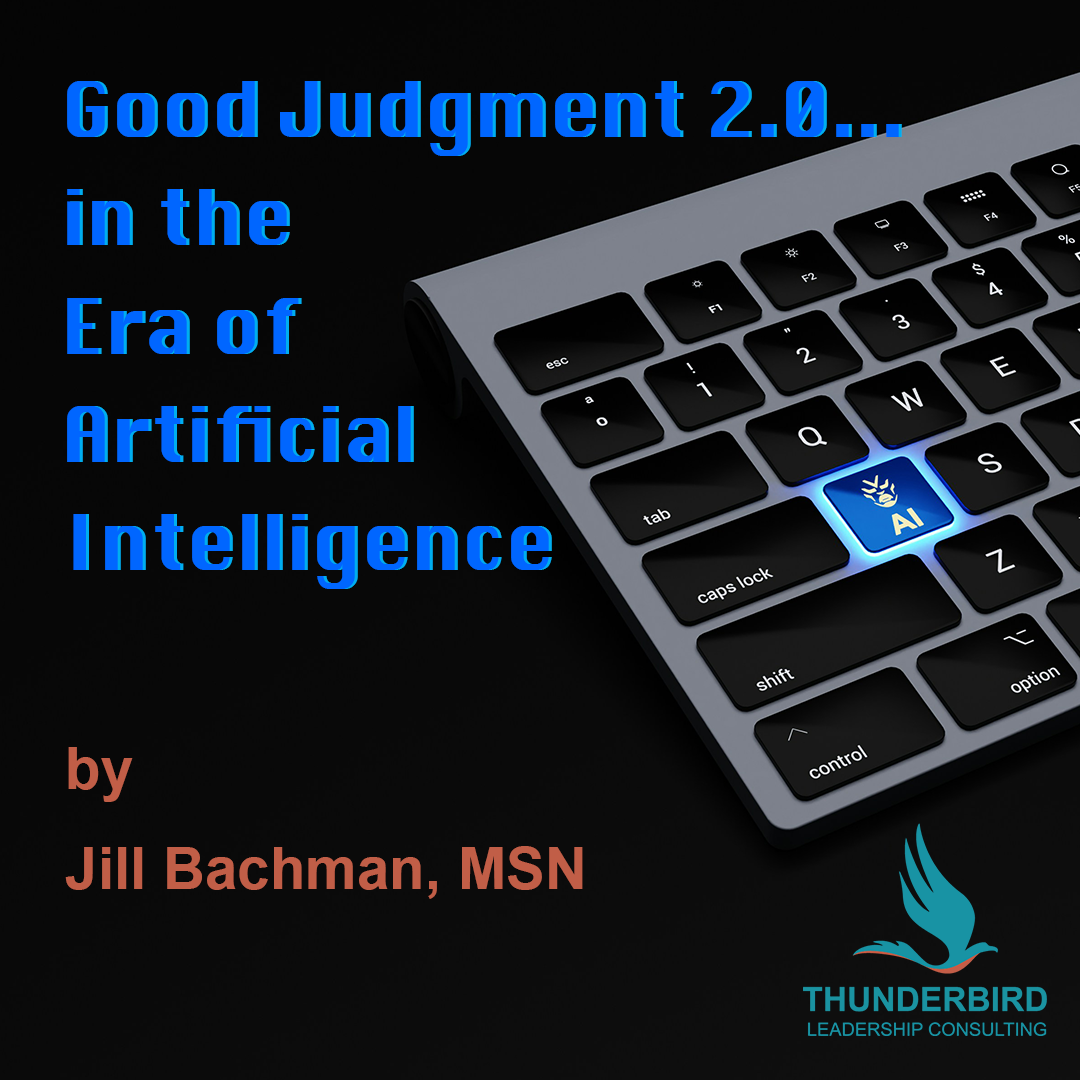Good Judgment 2.0…in the Era of Artificial Intelligence

By Jill Bachman, MSN
One of our 2020 blog topics (To Develop Good Judgment) described six critical elements of making decisions, from an article by Sir Andrew Likierman. In his new book, Judgement at Work, Making Better Decisions, his original insights remain solid.
Today we’re surrounded by data, dashboards, and now— AI. You’d think that with all this information at our fingertips, making great decisions would be easy. Yet as Likierman reminds us, having all the information in the world doesn’t guarantee good judgment.
Likierman defines judgement as “the ability to combine personal qualities with relevant knowledge and experience to form options and make decisions.” It’s the art of knowing what to do when the data alone can’t decide for you. In his research with CEOs, he highlights the six practices at the heart of good judgment: learning, trust, experience, detachment, options, and delivery. These still apply today—but AI adds a new twist, which can complicate matters as well as help.
Learning: Listen Attentively, Think Critically
Leaders are information miners. The trick is knowing what’s gold and what’s noise. With AI now curating, summarizing, and even writing our information, we need to ask “Where did this come from?” and “What could be missing?”
Quality beats quantity. Read and listen critically—whether it’s a human report or an AI-generated one.
Trust: Seek Diversity, Not Validation
It’s easy to surround ourselves with people—or algorithms—that agree with us. But real judgment comes from welcoming different voices and perspectives.
Don’t just trust data because it’s data. Ask who built the system, what it was trained on, and whose stories are left out. Good leaders build cultures and use tools that challenge assumptions, not just confirm them.
Experience: Make It Broad, Not Just Deep
Experience gives us a strong foundation—but it can also make us overconfident. AI, in its own way, “learns” from experience too—but only from the data it’s fed.
Leaders today need both human experience and digital insight—balanced with curiosity and humility.
Detachment: Check Your Biases—and Your AI’s
We all have blind spots. So do algorithms. The best leaders practice a bit of detachment—pausing to ask, “What’s influencing this decision? Is there something behind this that I don’t understand?” That could refer to ego, habit, or a hidden bias in the data itself.
Detachment helps us see clearly, especially when technology feels persuasive.
Options and Delivery: More Choices, Better Follow-Through
AI can help surface creative solutions we might not have considered—but it can also narrow our thinking if we let it decide for us, or if we decide too quickly. Remember, “recommended” doesn’t always mean “right.”
And once a decision is made, judgment shifts to execution. Even the smartest AI analysis won’t matter if people don’t understand, trust, or believe in the plan. If these are missing, execution can be faulty and miss your target.
The Bottom Line
AI is changing how we make decisions—but not what makes decisions good. Tools can help us analyze, predict, and plan, but only people can apply wisdom, ethics, and empathy.
Good judgment in the time of AI means blending the best of both worlds: human insight guided by machine intelligence, not replaced by it. Because when all is said and done, technology can assist by processing data—but only leaders can make meaning.
How is your organization strengthening judgment in an AI-driven world? Are you finding new ways to balance human insight with digital intelligence? If decisions and complexity are hampering your leadership practices, Thunderbird Leadership Consulting may be able to help shed light on your situation and reveal clarity. Or just reach out—we’d love to hear how you’re leading with judgment in this new era of decision-making.
References:
https://hbr.org/2020/01/the-elements-of-good-judgment (accessed 11/9/25)
https://www.hbs.edu/bigs/artificial-intelligence-human-jugment-drives-innovation (accessed 11/9/25)
Likierman, Sir Andrew. 2025. Judgement at Work, Making Better Decisions, Profile Books
